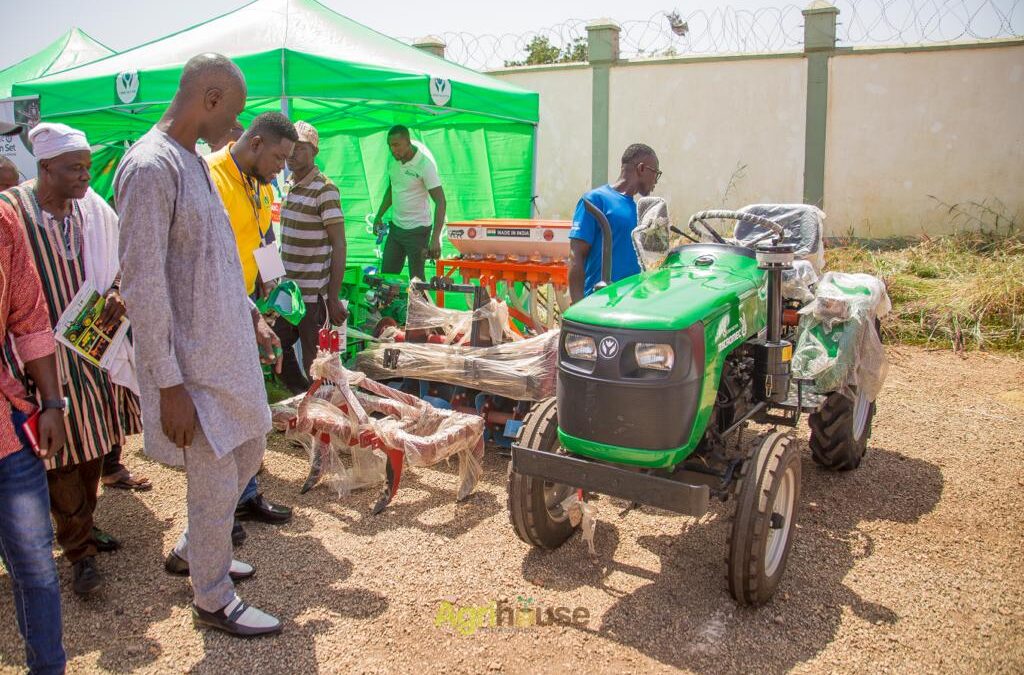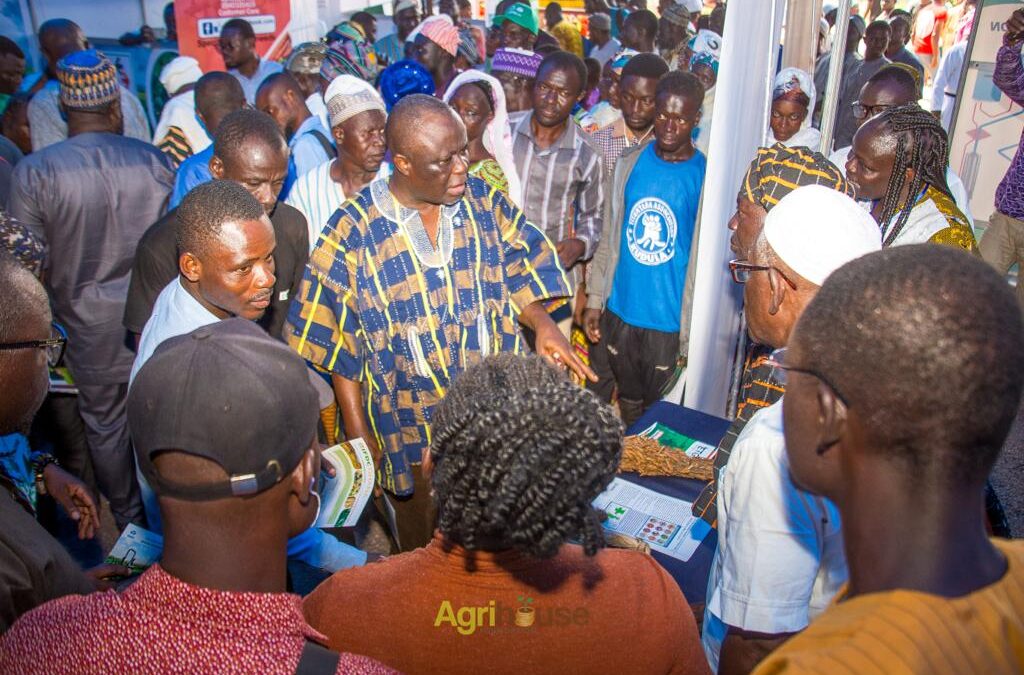
by Bismark | Oct 27, 2022 | Press Release
Agrihouse Foundation has opened its 12th annual pre-harvest agribusiness exhibition and conference to connect people involved in agricultural value chains.
The event, currently underway is taking place at the Aliu Mahama Sports Stadium in Tamale with the aim of encouraging business partnerships.
It is in partnership with the Ministry of Food and Agriculture (MoFA), and Northern Regional Coordinating Council, with sponsorship from from Yara Ghana, Ecobank, Agricultural Development Bank and GIZ.
The exhibition has the theme: “Connecting the Unconnected – The Farmer, the Buyer and the Market”.
It featured over 100 dealers who exhibited agrochemicals, seeds and farm machinery and inputs.
The three-day event includes commodity break-out sessions for farmers, processors and other participating categories to receive capacity building training.
Miss Alberta Nana Akyaa Akosa, Executive Director of Agrihouse Foundation, in her welcome address, said over the years, Agrihouse through the exhibition platform had linked small scale enterprises to buyers at local and international levels.
She said the platform had connected many agriculture value chain actors, generated substantial revenue, and urged participants to use the opportunity to build long lasting relationships with other businesses.
Mr Yaw Frimpong Addo, Deputy Minister for Food and Agriculture, said the Ministry acknowledged that pre-harvest conferences over the years had provided unique platforms for effective communication of plans and programmes.
He said agribusiness had also contributed to the country’s agricultural system, by eliminating gender biases, insecurity and promoting seasonal farming that had transformed and given practical meaning to agriculture in the country.
He stated that MoFA, since 2017, had set out strategic initiatives such as the Planting for Food and Jobs to tackle the fundamentals of agriculture.
Alhaji Shani Alhassan Saibu, Northern Regional Minister, commended Agrihouse Foundation for sustaining the event that connected agricultural stakeholders in the region.
He described the theme as apt and said poor market access during bumper harvest was becoming a major challenge militating against farmers in the country, adding that farmers would be disconnected from their markets if the situation persisted.
He urged stakeholders to invest in improving the state of market channels within the agricultural sector to halt challenges such as post-harvest losses, poor pricing and transportation issues.
Mr Danquah Addo-Yobo, West Africa Regional Director of Yara International encouraged participants to pursue opportunities and take advantage of Yara’s initiatives to grow their businesses.
He noted that as part of the Yara Grow Ghana initiative, the organisation would donate 300 bags of fertilizer each, to women in the Saint Cecilia Cooperative and the Northern Widows Association by the close of the event.
GNA

by Bismark | Oct 27, 2022 | Press Release
A pre-harvest agribusiness conference and exhibition, on the theme: “Connecting the unconnected: The farmer-the-buyer and the market”, is underway in Tamale in the Northern Region.
The three-day annual event, which is in its 12th year, began last Tuesday. It serves as a platform for the entire agribusiness eco-system in the north to dialogue and exhibit products.
It is being organised by the Agrihouse Foundation, an NGO, in partnership with ECOBANK, Yara International, the Ministry of Food and Agriculture (MoFA) and the Northern Regional Coordinating Council (NRCC).
Among the participants are fertiliser, irrigation and seed companies; dealers in tractors, machinery and equipment; technology firms, banks and financial institutions; processors, researchers, government institutions and development partners.
A Deputy Minister of Food and Agriculture, Yaw Frimpong Addo, said the government was committed to ensuring a paradigm shift in agriculture from being a way of life to a serious business.
He said the government would continue to place emphasis on adding value to the country’s agricultural produce for export and local consumption to create wealth for farmers and jobs for the teeming youth.
“Agriculture in any form should no longer be constrained or limited by socio-economic, cultural and other factors.
“The ministry has been tackling the fundamentals through the introduction of new policy initiatives and strategies under the Planting for Food and Jobs, our flagship programme,” Mr Addo added.
He commended the organisers of the annual event, saying it set the agenda to reap the full potential in agriculture through the creation of market linkages for actors in the value chain.
The Chief Executive Officer of the Agrihouse Foundation, Alberta Nana Akosua Akyea, said the event had, for the past years, become a leading market linkage on the country’s agricultural calendar
It also created opportunities for direct members and partners of the agricultural community to come together through exhibitions, field and practical training and demonstrations, buying and selling, as well as networking, she said.
“I am happy to report that for the past 11 years, Agrihouse and its partners, through this platform, have been connecting and engaging the agricultural sector, linking small-scale farmers and groups to buyers and connecting international agribusinesses to local ones,” she said.
According to her, the conference had recorded about 118 exhibitors, with a 45 per cent increase in exhibitor participation this year, adding that much sale of inputs such as machinery and equipment had been made.
The Northern Regional Minister, Shani Alhassan Shaibu, also commended the Agrihouse Foundation for organising the event over the years to connect farmers to various actors in the agricultural value chain.
He said despite the fact that agriculture was the backbone of the country’s economy, accounting for over 74 per cent of northern Ghana’s employment, it was unfortunate that the rich and diverse agricultural potential of the region remained untapped.


